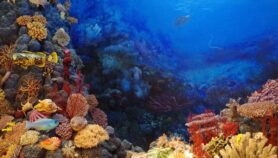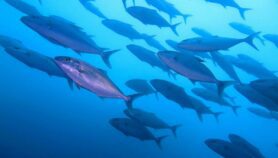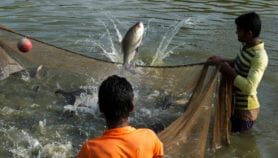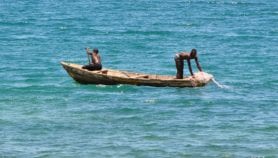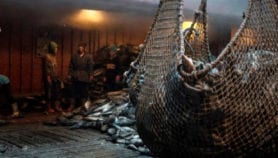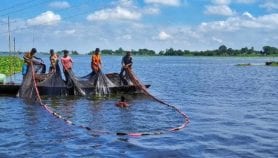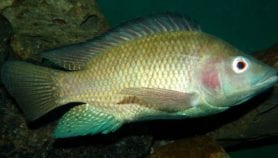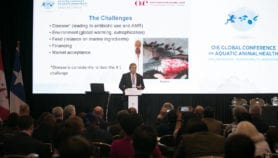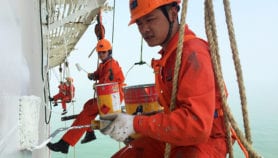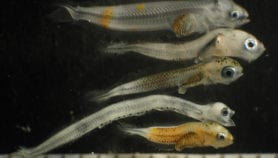By: Yojana Sharma
Send to a friend
The details you provide on this page will not be used to send unsolicited email, and will not be sold to a 3rd party. See privacy policy.
The Global Ocean Commission, a new independent body of politicians, businessmen, development experts and scientists, will meet for the first time next month, in Cape Town, South Africa, to start work on proposing the sustainable use of the oceans’ natural resources.
The commission will analyse the major threats to the high seas that are beyond national jurisdictions or over 200 nautical miles from coastlines. Its findings will also aim to inform the first laws to protect ocean biodiversity, which the Rio+20 summit stipulated should be in place by 2014.
The outcomes may also lead to a major overhaul of international laws governing the high seas, and better protection of biodiversity and the livelihoods of people in developing countries.
SPEED READ
- Global Ocean Commission will aim to improve commercial fishing management
- Livelihoods of the 200 million people dependent on fishing are at stake
- Outcomes may inform new international treaties, and use of new technologies in oceans
"This large proportion of the global ocean is under severe and increasing pressure from overfishing, damage to important habitat, climate change and ocean acidification," said a statement released at the commission’s official launch in London last week (12 February).
The global ocean "is essential to the health and wellbeing of each and every one of us" said José Maria Figueres, former president of Costa Rica and co-chair of the commission alongside South African minister Trevor Manuel and UK minister David Miliband.
"The world population is heading towards nine billion. All need food, all need equitable access to the resources that can give them a good standard of living, and a healthy, well-governed global ocean can help provide these things," said Manuel, during the inauguration.
Overfishing and environmental damage cause losses to the world economy of around US$50 billion a year, according to FAO and World Bank data. [1, 2]
About 75 per cent of world fish stocks are overfished, according to estimates. This unsustainable use threatens the livelihoods of the 200 million people who depend on fishing, 90 per cent of whom are in developing countries.
The commission, which includes politicians from Australia, Canada, Chile, Indonesia and Nigeria, will consider the views of ocean users, scientists, economists, business leaders and trade unions and will prompt more scientific examinations of the conservation of marine resources.
It hopes to improve the management of commercial fishing, help establish marine reserves and monitor some of the most vulnerable areas of the high seas, according to Alex Rogers, scientific director of the International Programme on the State of the Ocean (IPSO) and a professor of conservation biology at the University of Oxford.
Rogers tells SciDev.Net that although many areas of the high seas are still unexplored, there is enough data to enable the commission to draw up recommendations, while using the precautionary principle in areas lacking information.
This includes planning for future developments that might damage high seas ecology, such as deep sea mining and geoengineering.
"The data is there on certain aspects […] but in some areas there is inaccuracy," Rogers tells SciDev.Net. "Obviously the impacts of illegal fishing are difficult to gauge because of the nature of a criminal operation."
"There are large areas of the high seas, particularly the deep water column and the sea bed, which simply haven’t been explored," he adds. "We know that some of those areas have already been subject to exploitation for fisheries, which has been particularly harmful. But knowing that the fishing vessels have been there does not tell us what was there prior to the vessels going in, and the damage that’s being done."
Pavan Sukhdev, head of UNEP’s Green Economy Initiative and lead author of the 2010 Economics of Ecosystems and Biodiversity (TEEB) study, tells Scidev.Net that the commission’s report will in part be aimed at businesses preparing to exploit the high seas with new technologies.
The commission’s recommendations may include revisions to the 30-year-old UN Convention on the Law of the Sea which did not foresee such technological changes.
But any commission recommendations must also be equitable and not destroy the livelihoods of the poorest, Sukhdev says.
"Nature services matter much more to the poor. You can’t have a development model that is destroying the livelihood of 200 million people who depend on fishing and fish. We have to make the case that change is also in the interest of development."
Link to Global Ocean Commission press release
Link to FAO World Review of Fisheries and Aquaculture 2010 – part 3
Link to World Bank, The Sunken Billions: The Economic Justification for Fisheries Reform
References
[1] FAO, World Review of Fisheries and Aquaculture 2010
[2] World Bank, The Sunken Billions: The Economic Justification for Fisheries Reform (2009)




